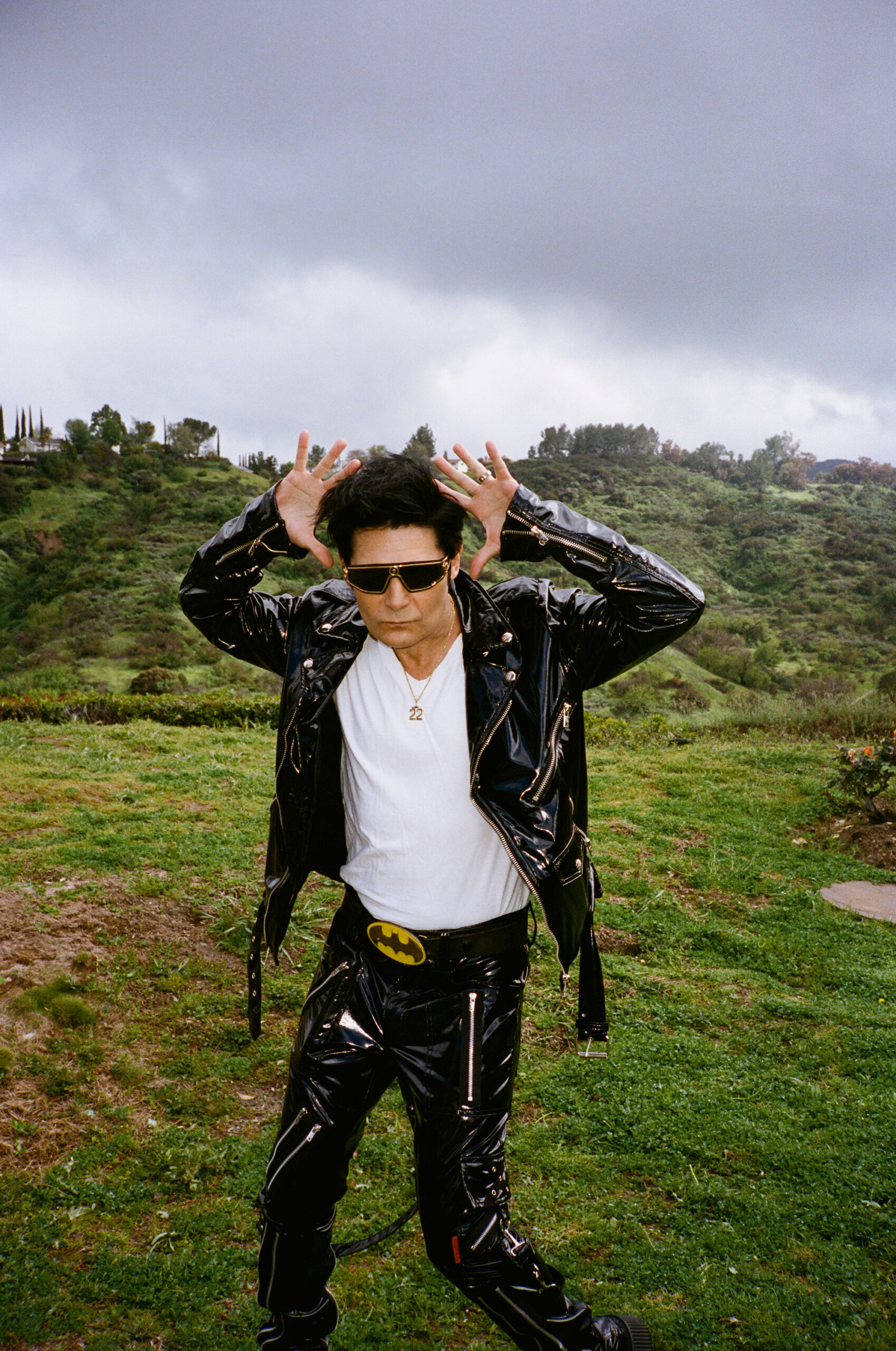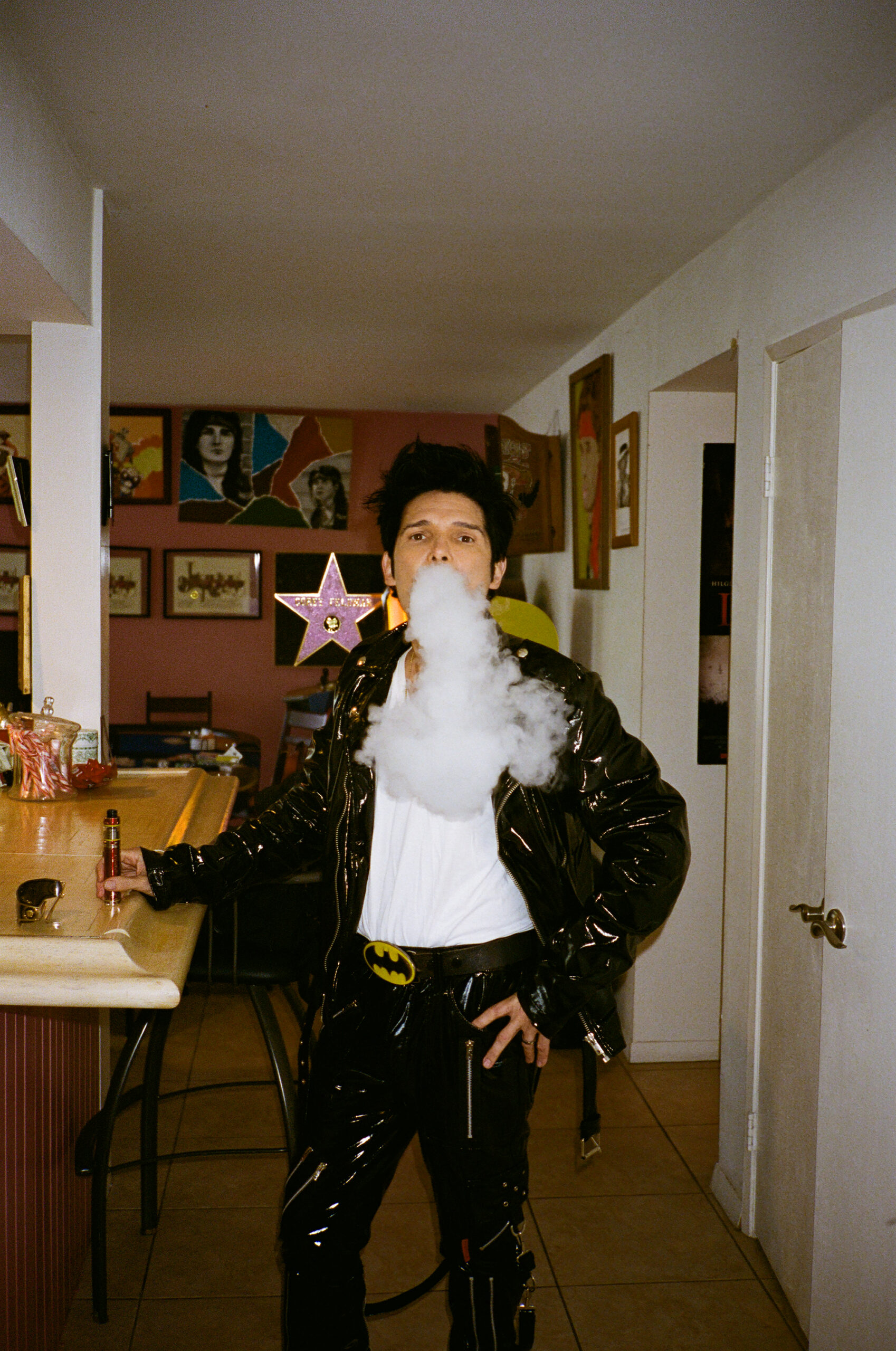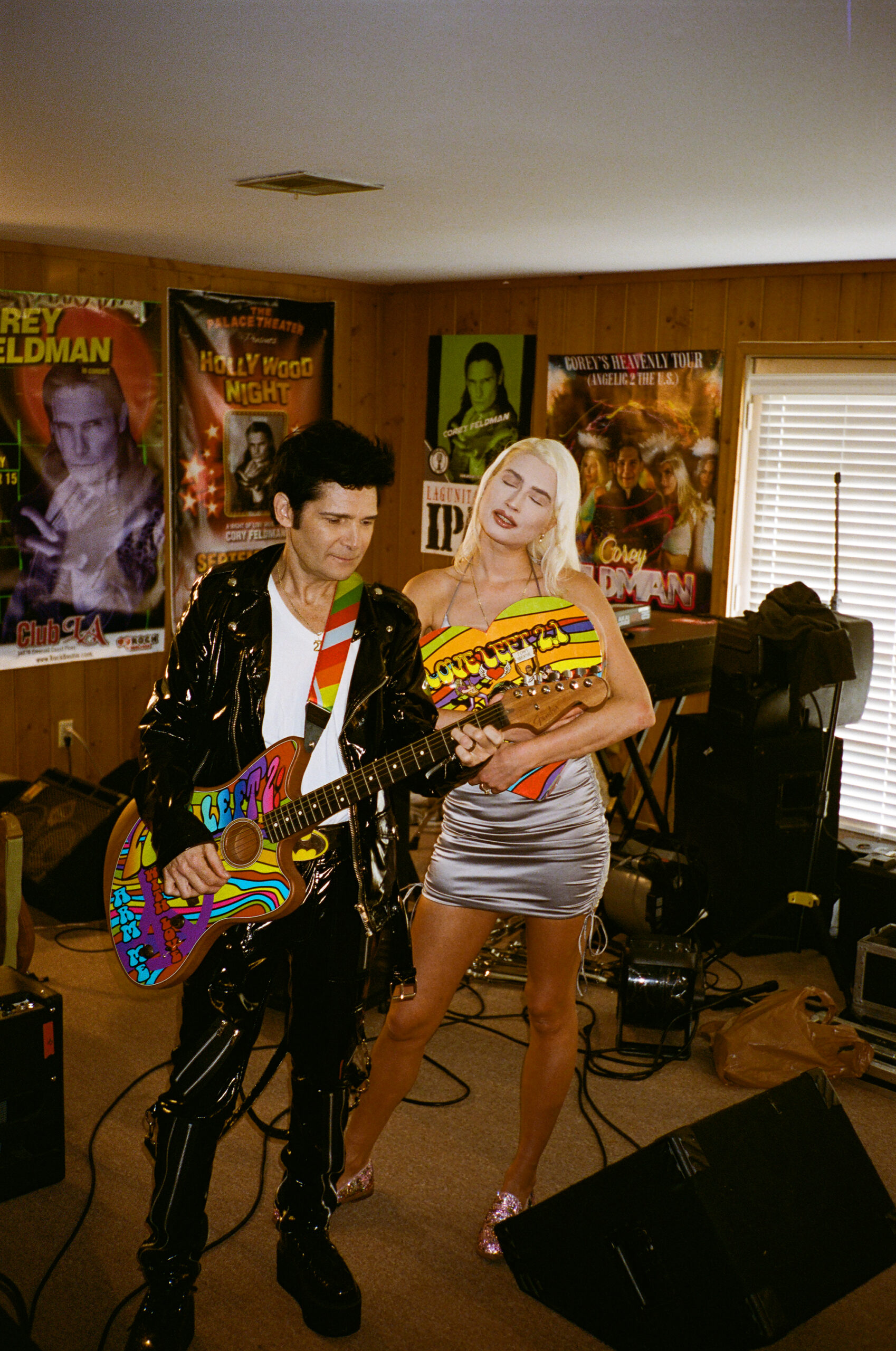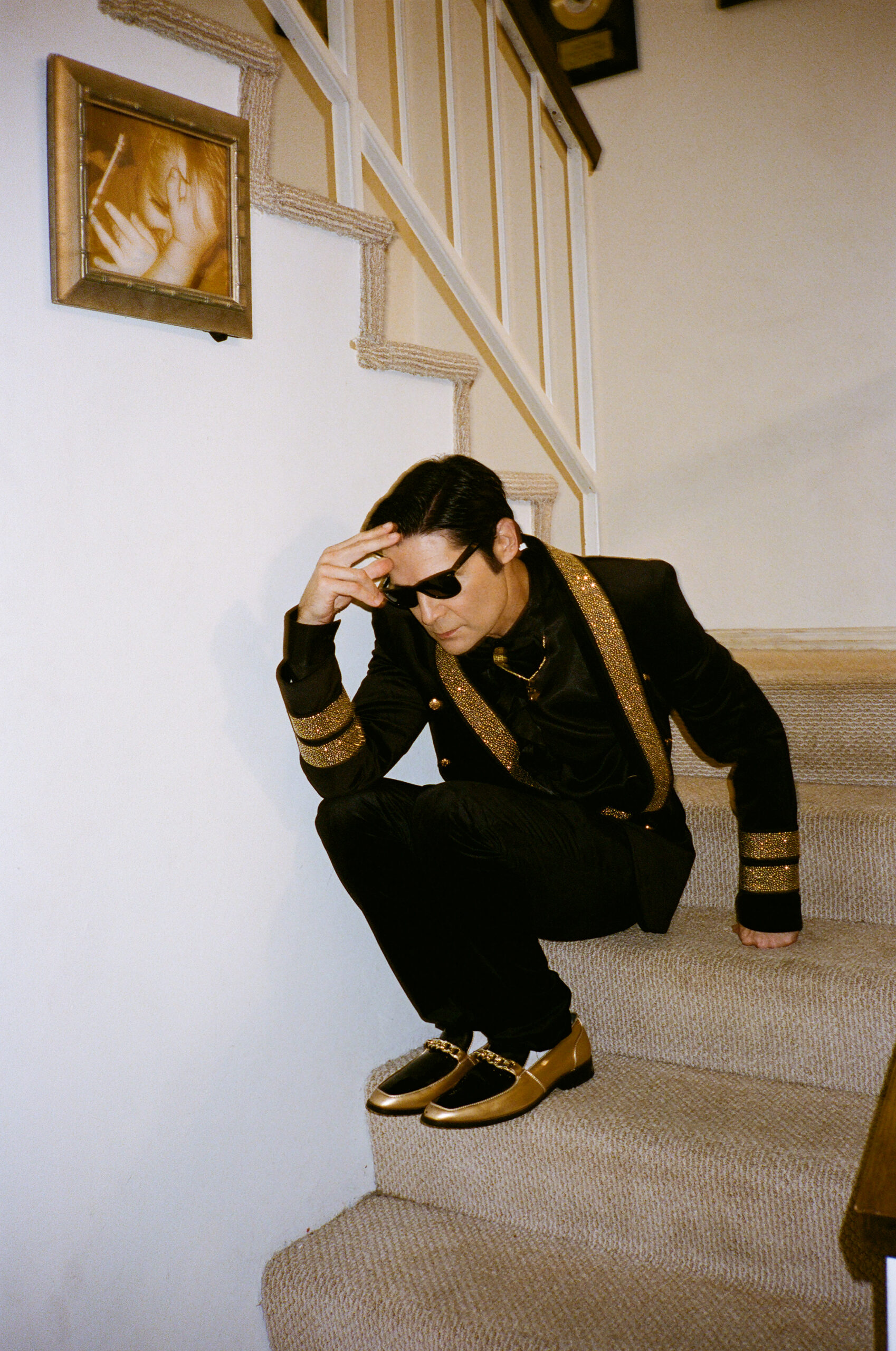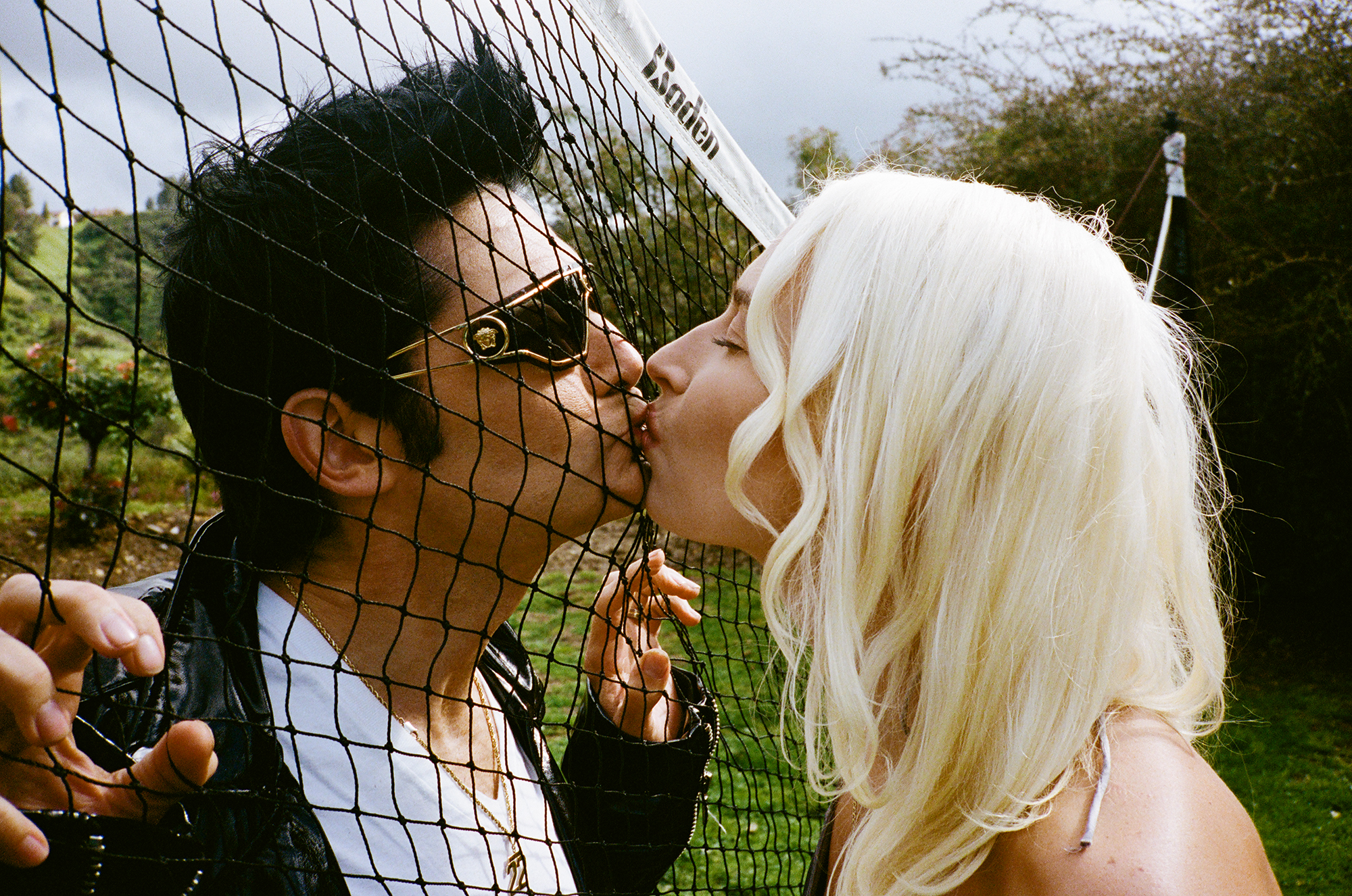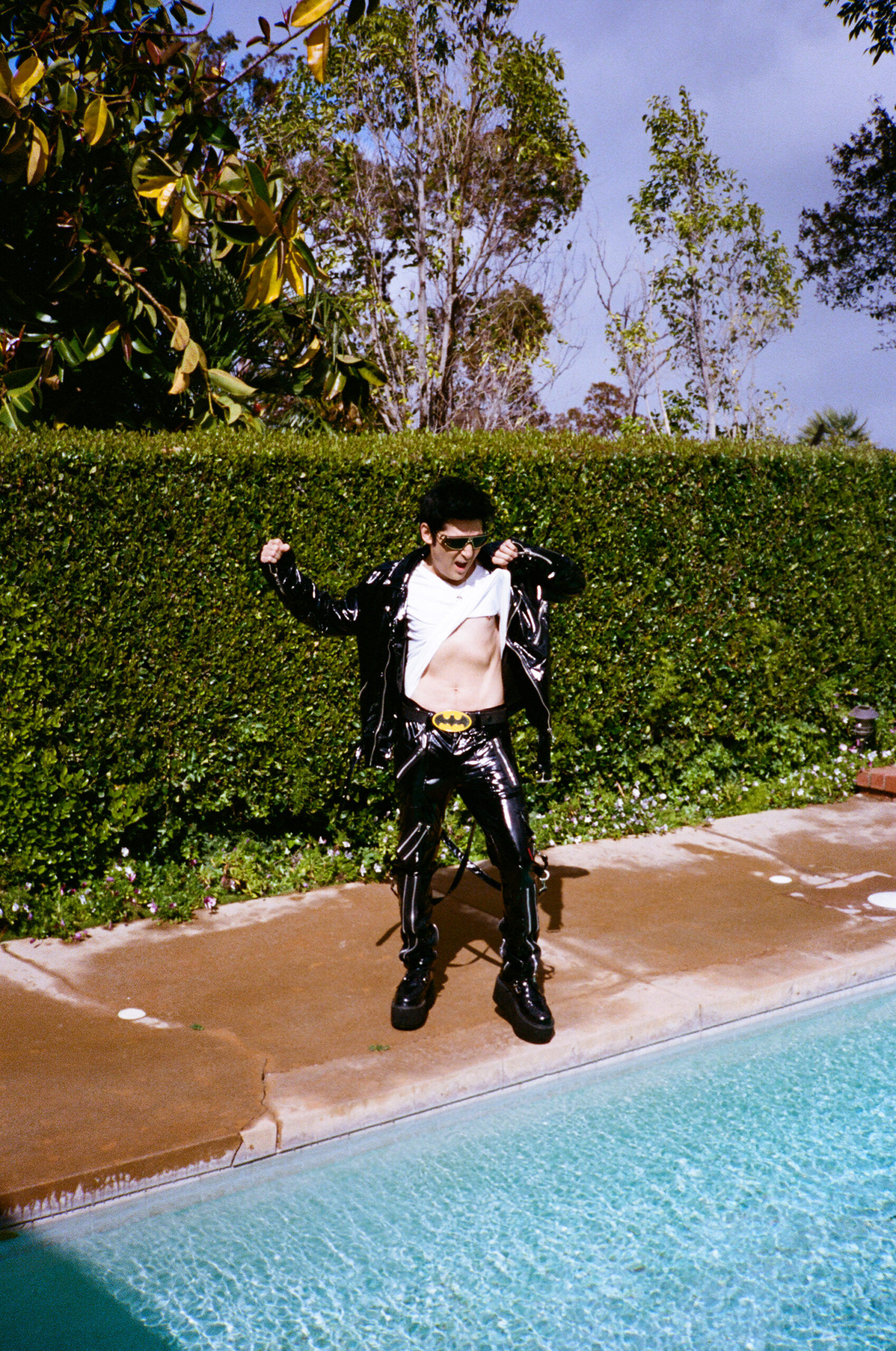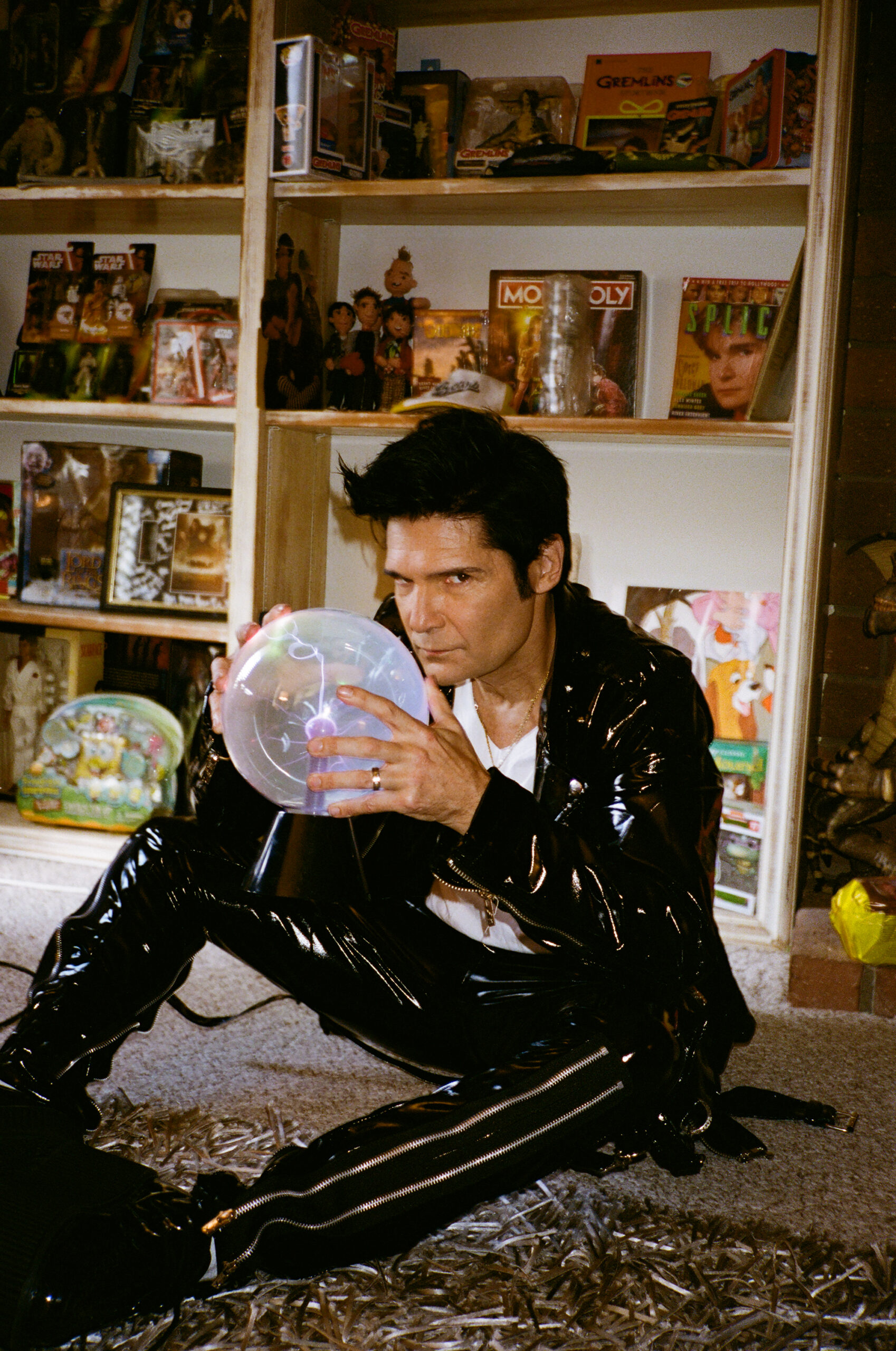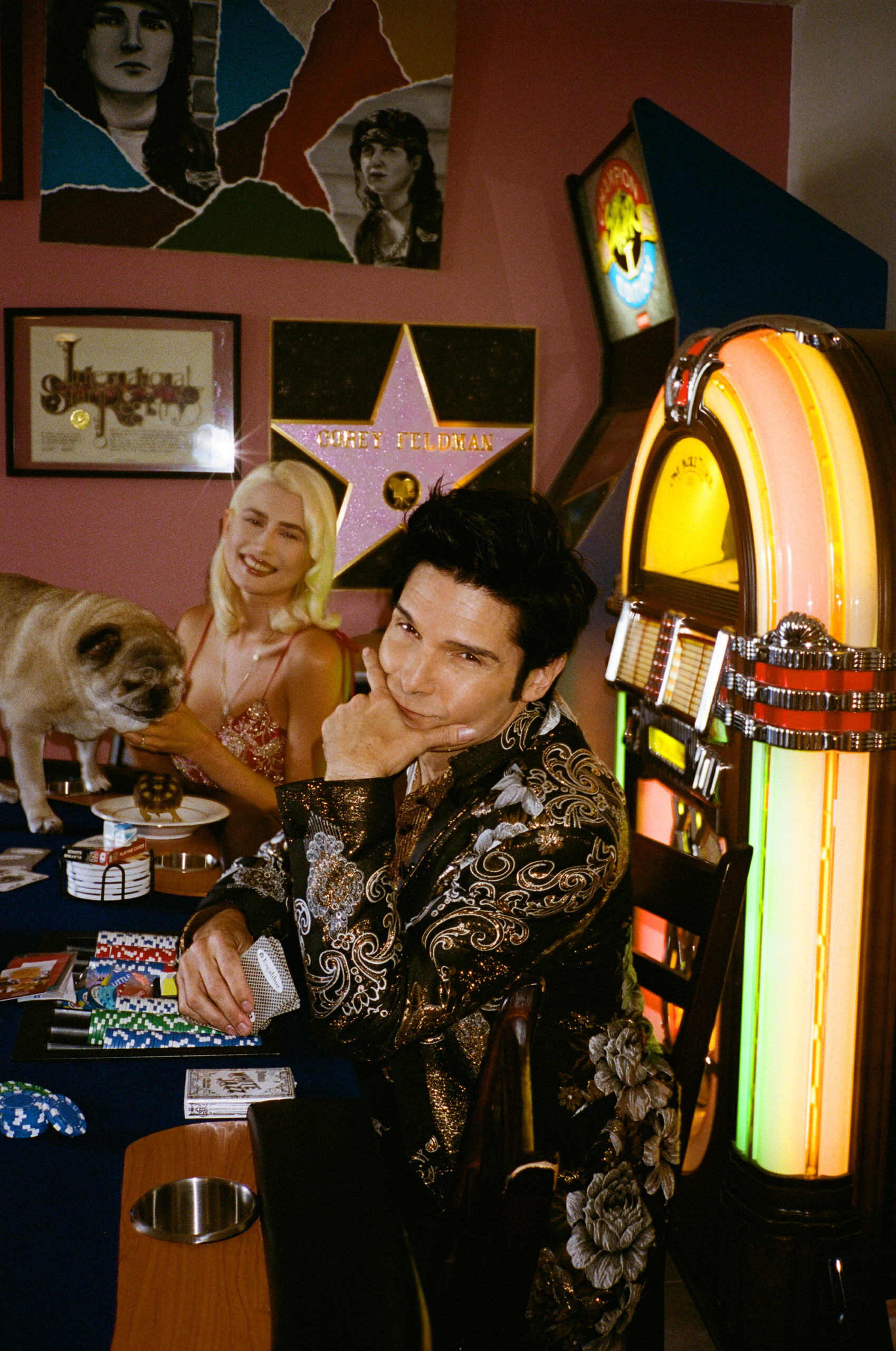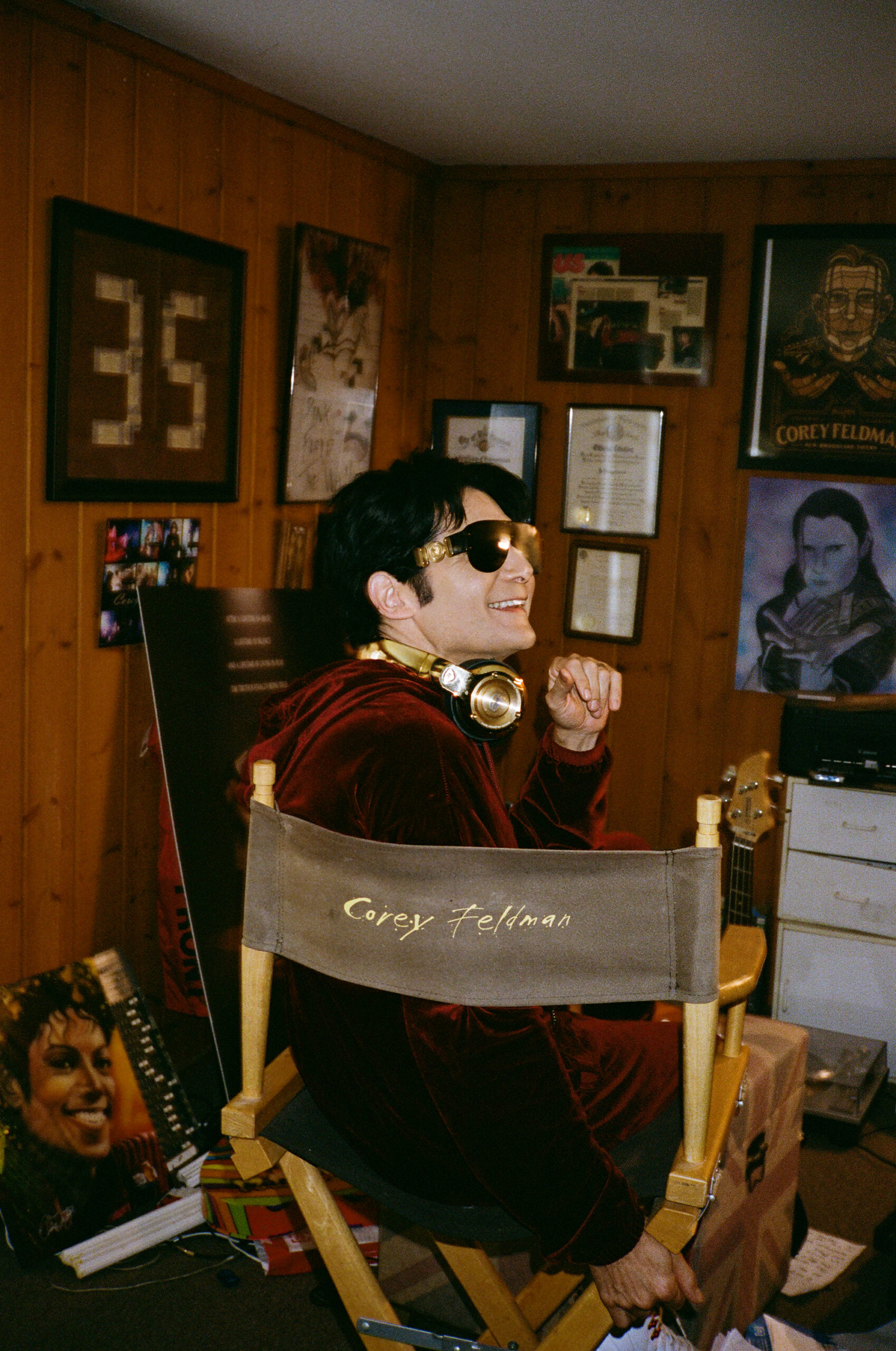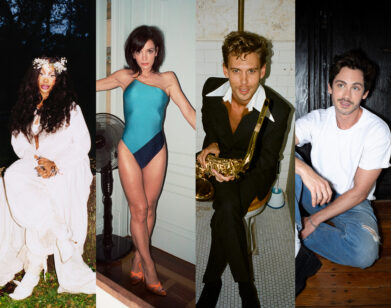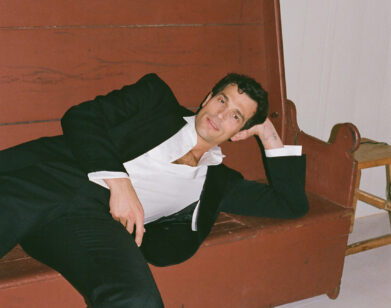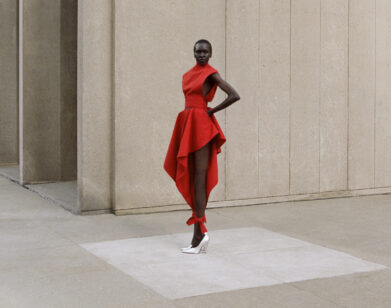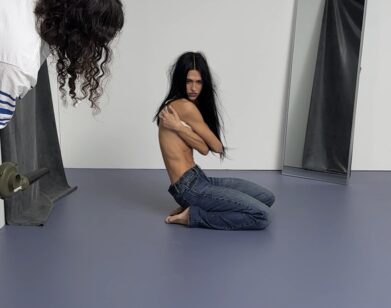HOLLYWOOD
Inside Corey Feldman’s Hollywood Paradise
“It was like having Hollywood injected directly into your veins,” Mel Ottenberg said after visiting Corey Feldman at his memorabilia-filled home. Interview’s editor-in-chief was in the Valley to document the daily life of the ’80s teen idol turned rocker as he prepared for another round of Comic-Con appearances and his first world tour. A few days later, the fast friends reunited on Zoom for a candid conversation about stardom, nostalgia, and the viral TikTok videos that introduced Feldman to a whole new generation of fans.
———
WEDNESDAY 1 PM APRIL 12, 2023 LA
COREY FELDMAN: Hi, Mel.
MEL OTTENBERG: Corey. What’s up?
FELDMAN: How are you buddy?
OTTENBERG: I’m good. Thank you so much for doing this. I’m so psyched.
FELDMAN: I appreciate it. It’s always been a dream of mine to do a big spread in Interview. I remember in the ’90s I thought, man, all the coolest people do that magazine. So I’m glad we finally found each other.
OTTENBERG: Well, we’re many eras of Interview later, but we still get all the right people. One day I was on TikTok watching a video of you performing “Cry Little Sister” and I was like, “I love that fucking song. We need Corey Feldman now.”
FELDMAN: [Laughs]
OTTENBERG: Also, I watched [Feldman’s 1987 film] The Lost Boys again last night. It’s so good.
FELDMAN: Thank you. You know, I just had a mini-reunion with some of the cast. I was with Jason Patric and Jamison Newlander doing Comic-Con in Liverpool. All these years later, we’re still friends. Jamison comes to my house for a weekly poker game.
OTTENBERG: That’s incredible. So wait, you’re at home, what are you up to right now? You’ve been doing a lot of traveling, right?
FELDMAN: Yeah, I’m in the middle of doing appearances. We’re gearing up for a big world tour so we’re in the process of planning it out. That video you’re talking about, it got 4.5 million views in three days. The guy who originally posted it was trying to diss me and it backfired on him because it showed the masses how good that performance was, and it got people to come see us on tour.
OTTENBERG: We needed it.
FELDMAN: It’s nostalgia, and we’re having a great time. My new album is called Love Left 2: Arm Me with Love. It’s about love, it’s about compassion, it’s about being selfless instead of selfish. So when we went on our last tour, what we wanted more than anything was to make sure there was a lot of love coming from the stage. And what we ended up with was this reciprocal experience where the audience gave that love back tenfold. The previous tour was not like that, we had a lot of weird things going on.
OTTENBERG: That’s beautiful. How do you deal with the naysayers on TikTok and Instagram?
FELDMAN: I used to let it affect me very deeply, but I’ve got elephant skin at this point. After what I went through with the documentary [My Truth: The Rape of 2 Coreys], watching the whole thing get torn apart and stolen from me after I spent so much time and energy and money, all of my resources—to watch it get ignored and then have all this negative blowback and gaslighting, it was a really dark period that caused more PTSD and trauma in my life than the actual abuse that I suffered as a child.
OTTENBERG: Right.
FELDMAN: There came a point where it was like I had to go back to trauma therapy, and I hadn’t been in therapy for 15, 20 years. I had to dive deep into my spirituality and go, “I’m not going to pay attention to the negative anymore. I need my happiness, I need my spirituality, I need my peace. And the only one that’s going to give that is god.” I’m a big believer, and I don’t think that there’s any way that I could have survived if I kept going the way I was. Instead, I’m focusing on the positive things in my life: my family, my spirituality, my new album, my box set, and this new documentary about my music career.
OTTENBERG: Oh, cool.
FELDMAN: During the pandemic I just dove into my work. I was very lucky because I got stranded in Jamaica for ten months. It was the most incredible, beautiful, positive place to be. I was surrounded by nature, and even if there was a hurricane it didn’t matter because I felt safe and at peace within. That really helped me rebuild.
OTTENBERG: As they say, sometimes after the biggest flop comes the biggest slay. Have you ever read The Dirt [Confessions of the World’s Most Notorious Rock Band], the Motley Crüe autobiography?
FELDMAN: I did not, because I have a very big problem with the writer, Neil Strauss. We were friends at a certain point and then he wrote some nasty things about me in his Marilyn Manson book.
OTTENBERG: Well, fuck that guy.
FELDMAN: Yeah, exactly.
OTTENBERG: But the reason I brought it up is because of the way they explain the long game of fame. It’s very you. You have this incredible string of hits at one of the greatest moments in cinema history. But when you’re the coolest teenager in Hollywood, it inevitably goes to shit. Now you’re back on top. Life regenerates, especially if you stay around long enough.
FELDMAN: That’s just it. Look at what happened to my dear friend Corey [Haim]. There’s been so many times in the last two, three years where I was like, “God, I wish Corey was here to see how many fans appreciate and adore him.” Because we didn’t feel it in 2007 when we were doing [the reality show] The Two Coreys. There was so much blowback. If he could have only just made it a few more years and seen the tide turning and the #MeToo movement start, he probably would’ve been able to tell it himself. We could have been on a streak right now—we could have done multiple sequels. That said, there is still hope that I might pop up in one of those.
OTTENBERG: You’ve got big fans in Hollywood, like Jordan Peele. I hope you get a big-ass show soon. I want to watch it.
FELDMAN: [Laughs] Thank you. Listen, I soft-retired from acting. I’ve been focused on my music. That’s my place of happiness. I’ve done a couple voice-work things. In fact, I play the lead role in a short HBO Max animated film. But I don’t chase it. I don’t do auditions. I don’t have an agent. People throw me stuff and if it looks inspiring, I’ll do it. But I’m more interested in producing my own content. I’ve produced two documentaries in the last three years. One of the big things for me right now is this movie The Birthday. It’s a film of mine from 2006, and Jordan Peele is the inspiration behind its rebirth. He and I became friends and I showed him the film. At the end, he looks at me and he goes, “Corey, this movie is a cinematic masterpiece. The world needs to see your performance.”
OTTENBERG: Wow.
FELDMAN: And then two months later, he calls me up and goes, “We’re putting together a little film festival at the Lincoln Center, and we’ve got all these films that helped inspire my movie, Nope. We’re going to feature four or five of your films. But the coup de grâce is, at the end of this series, we’re going to do the U.S. premiere of The Birthday. The first screening was completely sold out, and now there’s a lot of interest to actually get physical distribution, possibly theatrical distribution. It was definitely my most challenging role to date, and I’m super excited for the world to see it.
OTTENBERG: And you have a new box set and album out, too.
FELDMAN: The box set is great because it’s four CDs and two DVDs. We have my first album ever, Love Left, which has been remixed and remastered 30 years after the fact. There’s also a bunch of unreleased material and never-seen video footage. For the documentary, we had all the people who were part of the process of making these albums
come back and do interviews. There’s a lot of amazingly talented people involved, like Michael Damian, Mickey Thomas, and of course Curtis Young, who did the single “Comeback King” with me. Curtis is [Dr.] Dre’s son. I got a thing for working with rappers. I did “Go 4 It!” with Snoop Dogg, and then Fred Durst and I did a killer song on my last album.
OTTENBERG: So cool. Wait. When you look at popular culture today, who makes you be like, “Oh my god, they are so the Coreys.” Like, bad boys—
FELDMAN: I think that’s a misconception, Mel. I don’t think the Coreys were bad boys at all. I think the Coreys were abused kids who got really screwed over and were never given a fair chance.
OTTENBERG: Right. I was saying that in a non-sensitive way. What I meant is, real talents where you’re like, “Fuck, they’re amazing.”
FELDMAN: Right.
OTTENBERG: But did it take you a long time to get over your difficult past? How’d you do that?
FELDMAN: I’ll go back through the story a little bit to refresh the readers, okay? I was a very clean-cut kid. I played these obnoxious, loud, rambunctious characters, but I wasn’t that guy. I was sheltered. I was conservative and quiet and shy. It took a lot for me to come out of my shell. But these bad people came into my life at 15 years old and started corrupting me for their own reasons. They fed me drugs so they could take advantage of me. People think I do blow, or that I drink all the time, but the truth is, I only did drugs and drank alcohol for a period of three years, from 15 to 18. By 19 years old, I was sober. I went to rehab, I changed my life. It took three or four times to get it right, but once I committed to it, I was done.
OTTENBERG: Right.
FELDMAN: I became a spiritual person. I started helping other addicts. In fact, I was lecturing at universities at 19, 20 years old. I was helping people process their pain. I learned very quickly that there were going to be a lot of scars, and the media didn’t help because they were constantly driving this theme of “the bad boys.”
OTTENBERG: Totally.
FELDMAN: It’s been a rebuilding process since then. I’ve gotten to a point where I don’t really care what people think. At the end of the day, I know who I am, and that’s where my spiritual center is. I mean, look at my life today. I’ve got a beautiful family. I’ve got an amazing son who I love to death. I’ve got an amazing wife who I love to death. And I’ve been with the same woman for 12 years, which is almost unheard of in Hollywood. And then I have my work. The amazing thing is that when I do these conventions, I have a line around the building. I just did this convention in Liverpool, and I didn’t know if I would be popular in England, but I took 780 photos with fans over two days.
OTTENBERG: Fantastic. So you’re inextricably linked to the ’80s, right? Do you think there’s more of an appetite for ’80s vibes right now than there was before?
FELDMAN: The ’80s have become a coveted time period, and I think that’s because the films back then were so much more naturalistic and there was more depth to the characters. They put more energy into the cinematography and the making of those films. A lot of that art has been lost. Now, it’s about who can make the snappiest, most impressive CGI picture in each frame. But it’s painting it as opposed to letting life paint it itself.
OTTENBERG: Totally. So wait, what are you up to this summer?
FELDMAN: I’ll be gearing up for tour, and since I generally front-load everything myself financially, I’ll be doing a few more Comic-Con appearances. My big thing is reinventing the show. Every single song we do, we go back to the costumes that I’d be wearing during the era it was released. We do the same choreography from the videos. We use props, we use lasers, we use smoke, it’s a very big band, there’s six or seven pieces. So it’s a big production and it takes a lot.
OTTENBERG: How do you get yourself revved up and ready for a show?
FELDMAN: We do a big group prayer and then we just go out there and do it. I love it. I love seeing the fans and the smiles on their faces. And the best part is that they actually know all of the songs now. When I used to tour in the ’90s and the early aughts everyone was just there for the spectacle. Now, people sing along. But the show is intense and it’s very hard on the voice, especially when you’re singing songs
like “Cry Little Sister.”
OTTENBERG: You’ve inspired me. That has to be at the top of my karaoke list.
FELDMAN: [Laughs] You’ve got to come see a show, Mel. I think you’ll have an amazing time.
OTTENBERG: One hundred percent. I’m emailing your team after this. So I want to go back to the documentary, which I know we’re not getting that deep into. Where can people watch it?
FELDMAN: They can’t. I pulled it down. It was pirated. People stole it and gave it away to make sure that I couldn’t profit from it. At the end of the day, I’m okay with that because I never said, “This guy’s going to end up in jail,” and I never said I was going to make millions of dollars off it. My goal was to keep my promise to my best friend and tell the truth. And that’s exactly what I did.
OTTENBERG: Yes.
FELDMAN: You can google it and find out what happened. If we see it pop up on YouTube, we give it a copyright strike and pull it down.
OTTENBERG: Boom. Wait, before we finish I was wondering if you could share a good Corey Haim memory from the ’80s of him being the ultimate heartthrob Corey? Because he was such a heartthrob, right?
FELDMAN: You kidding? He was the best-looking guy I knew.
OTTENBERG: You met him on the set of The Lost Boys, right?
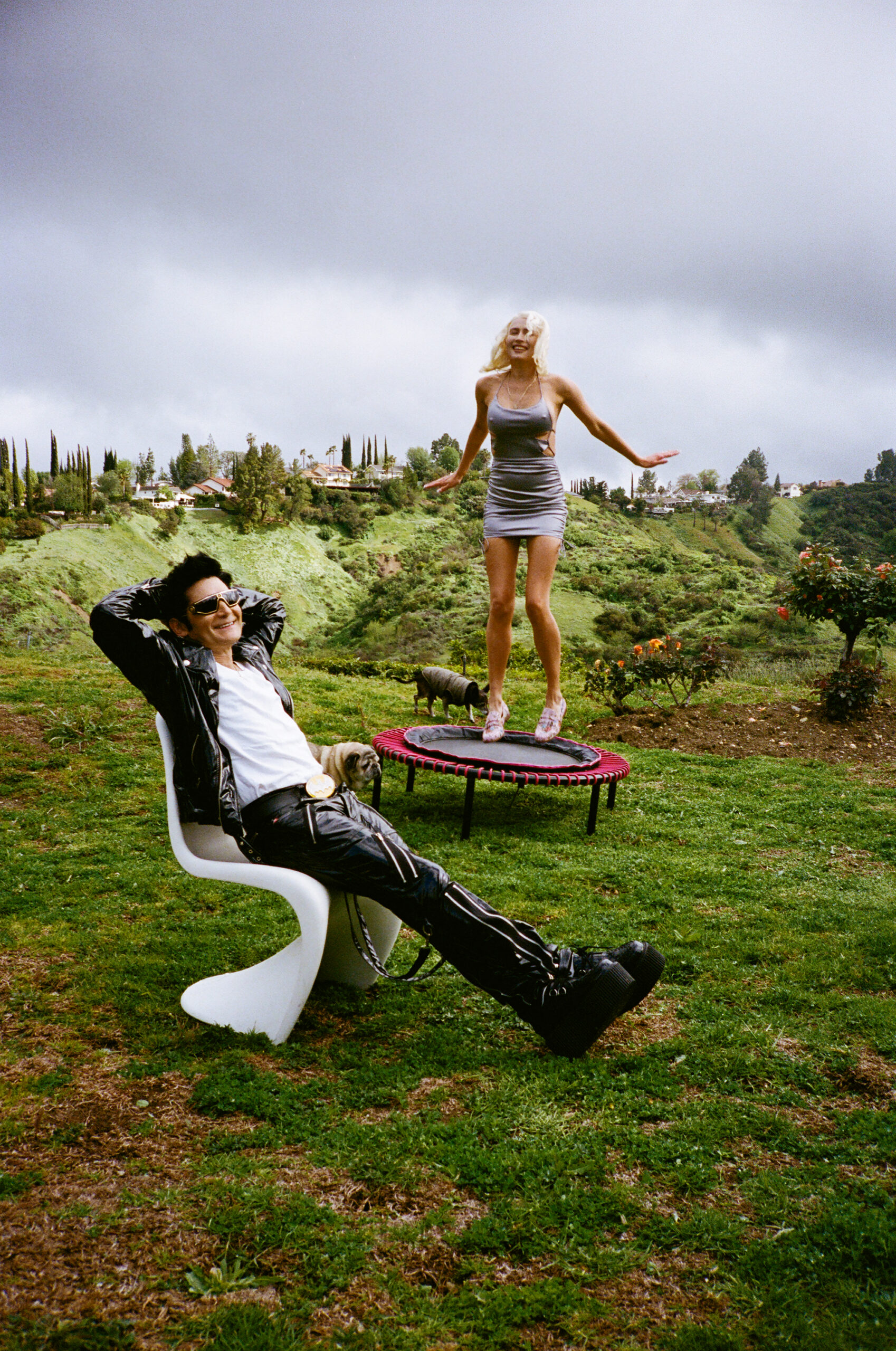
FELDMAN: Yes. I was actually in my wardrobe fitting with Joel Schumacher, and he got on a call with somebody from the studio. He’s like, “We’ve got the best cast. We’ve got Dianne Wiest, and we’ve got Barnard Hughes, and we’ve got the two Coreys.” And I go, “What do you mean two Coreys? I’m just one guy.” And he’s like, “Corey Haim is going to be in the movie
with you.” And I said, “Who’s that?” Around the same time, there was a girl that I had this mad crush on. She’s an actress. You know her. Her name is Robyn Lively.
OTTENBERG: Yes.
FELDMAN: Robyn and I became friends very early on, and I had a secret crush on her, and I was trying to find the courage to ask her out. We’d be talking late at night and she’d be like, “I just saw Corey. He’s such a dream.” And I’d be like, “What do you mean?” And she’d be like, “Corey Haim. He’s in all the same teen magazines you are.” So the next day I’d go out to the newsstand and be rifling through magazines, like, “Who’s this Corey guy?” I was a little hurt, to be honest.
OTTENBERG: Right.
FELDMAN: And then I get a phone call one day on my answering machine, and it’s this kid and he’s all bright and chipper, and he’s like, “Hey, man. It’s Corey Haim. We’re going to be rocking a movie together, and I think we’re going to be best friends. Let’s go to the beach and throw a ball around.” And I was like, “Okay.” The second that I met him, it was this brotherly connection. We were both there with our dads. We spent the day at the beach playing football and then we went back to his apartment and I probably stayed with him for the next three days. We literally became instant best friends. He told me all of his deepest, darkest secrets. And that’s really what started it all.
OTTENBERG: I love that. Instant best friends only happens once in a lifetime.
FELDMAN: That’s true. It was very organic.
OTTENBERG: One more question. Do you have any advice for people who are getting into their second act?
FELDMAN: Absolutely. My advice is, never give up, and never buy into the lies because it’s a losing proposition. You can’t get anywhere in life without believing in yourself. I know sometimes when you’re in a deep, dark place and you feel isolated, it seems like it’s never going to get better. But every day is a new day, and sometimes, even through the worst moments, you come out the other side and you’ve grown. What I’ve learned from all of my experiences is that pain is not something to fear. Pain is something to cherish, because at the end of that pain comes growth. As long as you can pick yourself back up and dust yourself off, you’ll be better and brighter and stronger in the end. And that is why I’m the Comeback King.
OTTENBERG: Bless you, brother. That’s the right ending.
———
Grooming: Fitch Lunar using Oribe at Opus Beauty
Fashion Assistant: Charlie Burke

